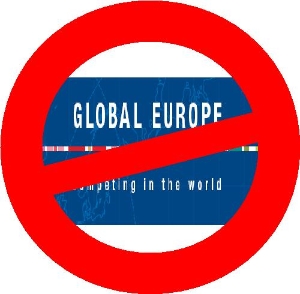
EU failure to reform international investment agreements will have costs for taxpayers and the environment
European campaigners have denounced the EU Commission for failing to adequately reform international investment agreements, warning that ordinary taxpayers and our environment will suffer as a result. The Seattle to Brussels Network today also published a reader on the issue.
Since the Lisbon Treaty entered into force on 1st of December 2009, the competence to negotiate international investment agreements has shifted from individual member states to the EU. Today, the European Commission adopted its investment policy proposals.
Trade justice campaigners working together in the “Seattle to Brussels Network” [1] are calling for a radical overhaul of international investment policy.
“Current EU member states’ Bilateral Investment Treaties (BITs) are all about rights for corporations and nothing about their responsibilities,” said Marc Maes, Trade Policy Officer of the Belgian NGO-umbrella 11.11.11. “They allow foreign investors to sue governments for social, environmental and economic regulations that are seen to affect company profits. The Lisbon treaty provided an ideal opportunity to change the balance back in favour of its citizens and the environment and terminate the member states’ BITs. But the Commission missed that opportunity.”
A whole industry of international law firms thrives on the extraordinary right of investors to directly challenge states through secret international tribunals without even having to exhaust domestic remedies.
“It is outrageous that the Commission wants to copy member states’ flawed practice of international investor-to-state arbitration. It is only a matter of time until European taxpayers will have to compensate foreign investors with hundreds of millions of Euros because they challenge policies in the public interest. It is high time investor-to-state arbitration is done away with all-together,” said Peter Fuchs from WEED, Germany.
The imbalance between corporate profits and environmental and social needs is typified by the litigation announced in April 2009 by the Swedish energy multinational Vattenfall against the German government. It challenges environmental restrictions imposed on a coal-fired power plant in the city of Hamburg. Vattenfall is seeking €1.4 billion in damages for delays and restrictions imposed upon the company’s project. European taxpayers will end up paying the costs, financially and environmentally. [2] “
Today the Commission has at least recognised that investment arbitration lacks transparency, that investment policies have to balance public and private interests with regard to expropriation and that they have to be in line with the human rights and sustainable development objectives of the Lisbon Treaty. But the Commission’s failure to specify and balance key provisions1 unmasks this as little but feel-good rhetoric,” said Antonio Tricarico of the Campaign to Reform the World Bank, Italy.
The Commission was supposed to release its proposals last week, but member states led by Germany and the UK intervened via their Commission members to get rid of a provision in the draft regulation that would have put an expiry date on the existing BITs. The draft adopted today only provides for a “review”.
The Seattle to Brussels Network today also published a 45 pages strong reader on the issue of international investment policy: EU Investment Agreements in the Lisbon Treaty Era: A Reader. A civil society statement demanding an international investment policy in the public interest has been sent to Parliamentarians, EU member states and the Commission.
[1] The Seattle to Brussels (S2B) Network(opens in new window)
is a pan-European network of more than 70 organisations from 16 countries campaigning to promote a sustainable, socially and democratically accountable system of trade. It includes development, environment, human rights, women and farmers organisations, trade unions, social movements as well as research institutes. The S2B Network is part of the global coalition ‘Our World is Not for Sale(opens in new window)
’.
[2] IISD (2009): Background paper on Vattenfall v. Germany arbitration(opens in new window)
Related news
-
 CSDDD Datahub reveals law covers fewer than 3,400 EU-based corporate groupsPosted in category:News
CSDDD Datahub reveals law covers fewer than 3,400 EU-based corporate groupsPosted in category:News David Ollivier de LethPublished on:
David Ollivier de LethPublished on: -
 Additional evidence filed against Booking.com for profiting from illegal settlementsPosted in category:News
Additional evidence filed against Booking.com for profiting from illegal settlementsPosted in category:News Lydia de LeeuwPublished on:
Lydia de LeeuwPublished on: -
 The hidden human costs linked to global supply chains in ChinaPosted in category:News
The hidden human costs linked to global supply chains in ChinaPosted in category:News Joshua RosenzweigPublished on:
Joshua RosenzweigPublished on:

